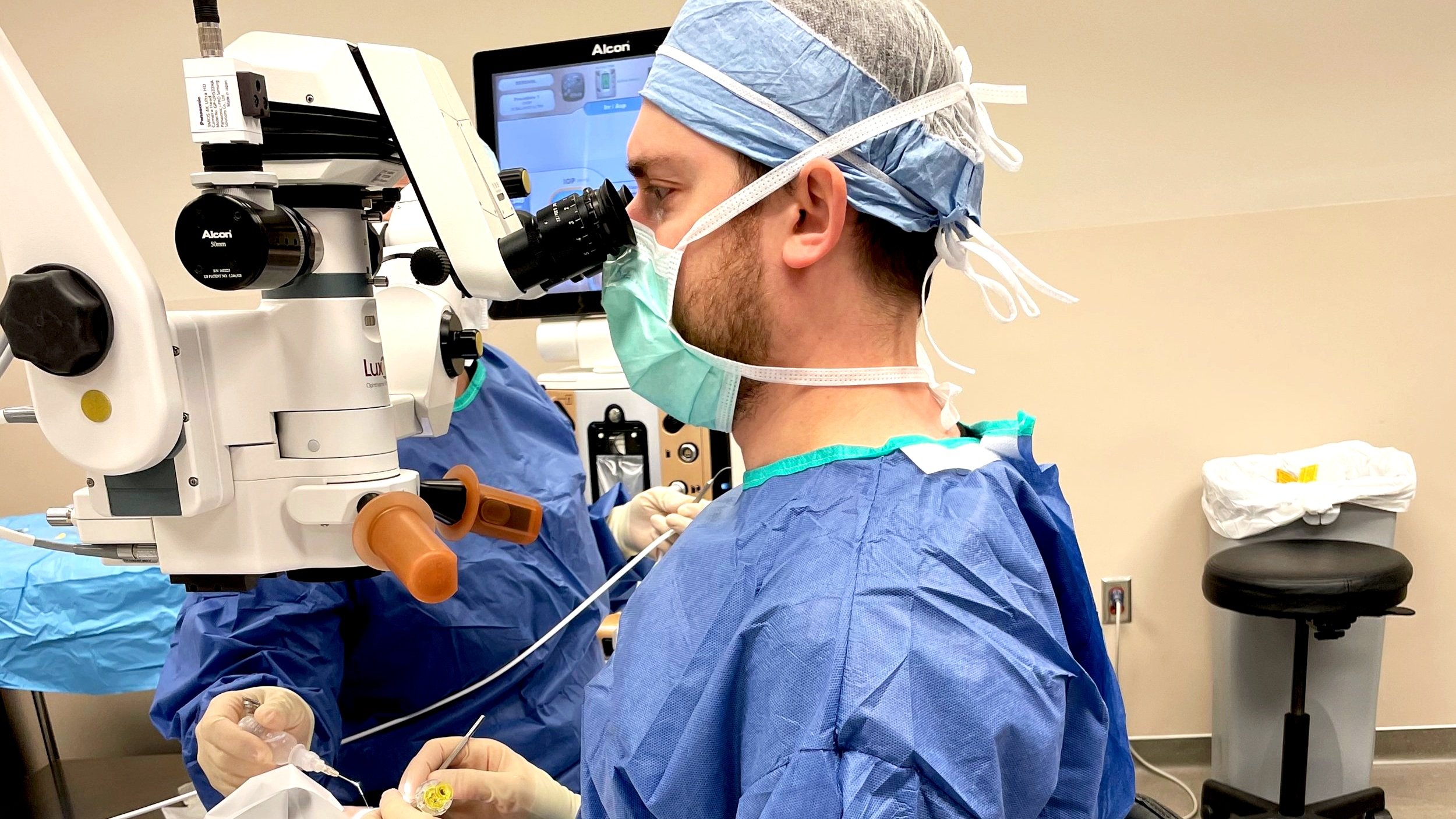
“Taking on the most difficult of cases is a honor that comes with significant responsibility. As one of a handful of surgeons in Philly that can revise dislocated IOLs, I take my job seriously. ”
Revision Surgery Philadelphia
Your Sight, Our Passion
Providing the highest quality surgical experience for patients from Montgomery, Bucks, Chester, and Delaware Counties. Easy access from Horsham, Plymouth Meeting, Fort Washington, Collegeville, King of Prussia, Philadelphia, Dresher, Blue Bell, Doylestown, Gladwyne, Bryn Mawr, Villanova, Devon, and Berwyn.

At the time of cataract surgery, we implant an intraocular lens (IOL) that is intended to stay in place for the rest of life. Unfortunately, due to factors such as aging, trauma, surgical complications, or underlying conditions such as pseudoexfoliation syndrome, the IOL does not always stay in place. A dislocated IOL is the name for an IOL that is no longer centered inside of the eye. Patients typically describe a sudden onset of blurry vision or that they can see the edge of the lens. This can be very distressing, and finding a surgeon to take on the challenge of fixing the IOL is not always straightforward. At SVI, we are committed to being there for our patients, regardless of the severity of the disease.
Revisions at SVI
Dr. Shafer has been committed to learning and implementing the latest techniques for repairing dislocated IOLs such as the Yamane technique, Canabrava technique, and McCabe belt loop technique. These are options that few other surgeons in the Greater Philadelphia area are offering. Because of the complex nature of the surgery, it is important to find a surgeon with experience, such as Dr. Shafer. Additionally, these surgeries may result in the need for further intervention such as corneal transplants, glaucoma surgery, or repositioning of the lens. Dr. Shafer is the only dual-trained cornea and glaucoma surgeon in the Philadelphia area, and therefore can be trusted to take you across the finish line.

Frequently Asked Questions about Revision Surgery
-
A dislocated IOL is a condition in which the artificial lens that was placed in the eye during cataract surgery, called an intraocular lens (IOL), becomes displaced from its original position.
-
A dislocated IOL can be caused by a number of factors, including trauma to the eye, prior retinal surgeries, poor surgical technique, or a weakness in the eye's natural supporting structures. Pseudoexfoliation Syndrome is a genetic condition that can lead to weakness of the support structures holding the lens in place.
-
Symptoms of a dislocated IOL can include blurry or distorted vision, double vision, and glare or halos around lights.
-
Treatment for a dislocated IOL typically involves either exchanged the dislocated lens or repositioning the lens back into its proper position. This can be done with a surgical procedure called an IOL repositioning or exchange. This procedure is very involved and often must be done in 2 or 3 separate surgeries. Based on your specific condition, Dr. Shafer will inform you of your expected treatment course.
-
Like any surgery, there are risks associated with IOL repositioning or exchange surgery, including infection, bleeding, and retinal detachment. Additionally, because these eyes are starting with a complication, it is more common for complications to occur. On occasion, the cornea will not recover from the IOL exchange and may ultimately require a corneal transplant. Dr. Shafer is a fellowship trained cornea and glaucoma surgeon and is uniquely suited to handle any complication that can arise from repairing a dislocated IOL.
-
While IOL repositioning or exchange surgery can significantly improve vision, it may not be perfect. Almost all patients will need to wear glasses or contact lenses after the surgery.
-
Most insurance plans cover IOL repositioning or exchange surgery, but it is important to check with your insurance provider to confirm coverage.
What Are You Waiting For?
It’s Time to Fix Your Vision
Schedule your free consultation now
Specialty Surgery at SVI
Refractive
Surgery
Correct your vision with our cutting-edge refractive surgery options, including LASIK, PRK, RLE, and ICL. Dr. Shafer utilizes state-of-the-art equipment to help you achieve clear vision, reducing or eliminating the need for glasses or contacts.






